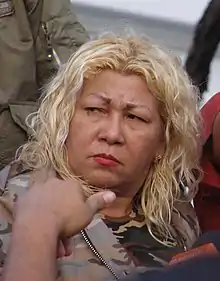Lina Ron
Ninette Lina Ron Pereira (September 23, 1959 – March 5, 2011) was a Venezuelan political leader. She was the founder and president of the Venezuelan Popular Unity party, one of the parties which supported President Hugo Chávez. Ron ran one of the Bolivarian Circles.[1] She died of a heart attack in 2011[2] at the age of 51 and was buried in the South Cemetery of Plaza Andrés Eloy Blanco.[3][4] President Chávez extolled her as "a true soldier of the people" and a "complete revolutionary."[3]
Lina Ron | |
|---|---|
 | |
| Born | Ninette Lina Ron Pereira September 23, 1959 Anaco, Anzoátegui, Venezuela |
| Died | March 5, 2011 (aged 51) |
Early life
Lina Ron was born in Anaco, in the state of Anzoategui on September 23, 1959.[5] She was the fourth child of Manuel Ron Chira, a political leader, and Herminia Pereira.[6] She and her six brothers plus eight cousins were raised by Lina Ron's mother after her father Manuel went to prison after being convicted of murder.[6]
Political career
She moved to Caracas at the age of 27 and worked in a shopping mall before becoming a leftist student leader in the Comité de Luchas Populares (CLP), where she agitated supposedly in favor of students and street vendors. She dyed her hair platinum-blond and played an important role as an activist.[3]
Political approach
Ron was very aggressive and volatile in her radical political approach to the point that even Chávez called her "uncontrollable", and she even labelled herself as the "ugly part" of the "revolution".[3][4] She was also a leader of one of the Bolivarian Circles called La Piedrita stating that such circles were "armed to the teeth".[7] In 2008, she and her companions had attacked the Archbishop's Palace in Caracas and irascibly evicted people who were there, and had adamantly demanded the support of the Catholic Church to the cause of the revolution.[3][4] In 2009, Ron led an armed attack on Globovisión, where she and attackers threw tear gas into the headquarters of the news organization that left injured multiple individuals inside and threatened its security with firearms.[6] She then went to jail for three months following the 2009 attack and was allegedly recommended to be placed on the United States' Visas Viper for suspected terrorists due to the violent actions.[6][8]
Death
On 5 March 2011, Andrés Izarra, then head of the Ministry of Popular Power for Communication and Information announced that Lina Ron died of "coronary obstructive disease of long standing".[5] Officials of the Bello Monte morgue in Caracas ruled that she did not die of a rumored drug overdose since there were no leaks found on any of her organs.[5] Following the death of Ron, President Chávez stated that she "was a sharp sword and living flame of popular socialist Bolivarian Revolution" and that "with the departure of Lina Ron the sword sharpens more and the flame grows more".[6]
References
- Nichols, Elizabeth Gackstetter; Morse, Kimberly J.. (2010). Venezuela. ABC-CLIO. pp. 219–. ISBN 978-1-59884-569-3. Retrieved 25 May 2013.
- "Venezuela radical Lina Ron dies". BBC. March 5, 2011. Retrieved 25 May 2013.
- "Venezuela radical Lina Ron dies". BBC News. Retrieved 28 May 2013.
- "The UPV leader Lina Ron died" (in Spanish). El Universal.com. 5 September 2011. Retrieved 28 May 2013.
- "Autopsy revealed that Lina Ron died of heart disease". El Tiempo. 5 March 2011. Archived from the original on 4 April 2015. Retrieved 1 March 2015.
- "Especial N24: polémica e irreverente, la vida de Lina Ron a tres años de su muerte". Noticias24. 5 March 2014. Archived from the original on 8 March 2015. Retrieved 1 March 2015.
- "Venezuela's Pro-Government Activists Play a Role in Protest Violence". Stratfor. Retrieved 1 March 2015.
- "Wikileaks de Venezuela: chavistas Lina Ron y Valentín Santana, "terroristas" para Washington". Semana. 4 July 2011. Retrieved 1 March 2015.